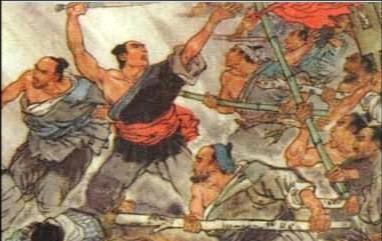What is history: it is the echo of the past to the future, the reflection of the future on the past. - Hugo
Everyone should be familiar with the history of the Qin and Han Dynasties, the Chronicle of Chen Shengyibing, who entered Chen Shi and said that Chen Sheng was called Dachu, "According to Chen, within a few days, he ordered the summons of the three elders, Hao Jie, and all of them to account for affairs." The three elders, Hao Jie, and the generals were all strong, stubborn, ruthless, and violent, and the society of the restoration of the Chu kingdom was established, and the merits were made king. 'Chen Shi is established as king, and his title is Zhang Chu", Yun yun. Chen Sheng and Wu Guang rebelled against Chu, who had previously been destroyed by the State of Qin. In the Xiang Yu Benji, the Duke of Chu Nan has a saying: "Although Chu has three households, the death of Qin will be Chu", and the slogan of "Chu" is also more respected. Including the later rebel armies, all respected Chu, including the later Xiang Yu, who called himself the Overlord of Western Chu. In many history books, the peasant revolt at the end of Qin is directly summarized as the "Battle of Qin and Chu", and after the fall of the Qin Dynasty, the war between Liu Bang and Xiang Yu was called the "Battle of Chu and Han".

Peasants' War at the end of the Qin Dynasty
So why did the Qin state have to honor "Chu" instead of one of the yan, Zhao, Han, Wei, and Qi states? And since Zun Chu, the whole world has responded, why is it? Let's go into a brief explanation.
To answer the above question, we have to go back to the end of the Warring States period. At the end of the Warring States period, the State of Chu and the State of Qin were relatively weak compared to the State of Qin, and even so, the State of Chu was still one of the most powerful of the Six Kingdoms. Especially after the Battle of Changping in Qin and Zhao, the State of Chu became the most powerful force against the State of Qin. Although the Qin Dynasty destroyed the Chu State, the Qin Dynasty took a very long time and suffered heavy losses. In 241 BC, the five kingdoms of Chu, Wei, Zhao, Han, and Wei united to attack the State of Qin, and the central position was the State of Chu. Although the Five Kingdoms were defeated and the Chu State was forced to move its capital, the Chu State did not collapse.
Another very important point is that everyone knows that the peasant revolt at the end of Qin mainly began with Chen Sheng and Wu Guang, and Chen Sheng was a Chu person, and his family was a Yangcheng person, which was Chu Di. Chen Sheng used the revival of the Chu state as a slogan, and it was easy to launch a local uprising.
Another point is that although the Qin State destroyed the Six Kingdoms, although the remnants of the Six Kingdoms have always hated the Qin State very much and missed their homeland, they were forced to oppose Qin because of their weak strength. However, the remnants of the Six Kingdoms have been using non-violent means in their anti-Qin campaign to spread the negative impact of the Qin State. In this regard, the State of Qi has done a very good job, and their opposition is the highest, and they have been attacking the State of Qin in public opinion. Of course, the later book burning pit Confucianism and these activities of the Six Kingdoms do have a certain relationship.
In terms of armed opposition to Qin, the remnants of the Chu state have done the most prominently, and their desire for revenge is the strongest. Of course, Qin Shi Huang had always paid special attention to chudi's movements, always been wary of chudi, and had been suppressing the chu riots more thoroughly. Qin Shi Huang formulated many systems for the Chu and Qi states. The State of Qin once organized a large-scale and large-scale migration movement, moving about 100,000 people from the land of Qichu to Xianyang and its surrounding areas, and the main surnames that were migrated were the big surnames of the land of Qichu, such as Zhao, Qu, Jing, Huai, and Tian. Although the remnants of Qi Chu were under heavy guard, they still could not suppress their rebellious and retaliatory psychology against the Qin state.
Although Liu Bang later defeated Xiang Yu in the name of the King of Han, his power did originate from Chu and could be said to be a branch of Chu. Although many later changes occurred and Liu Bang established the Han Dynasty, on the whole, the peasant war at the end of Qin still belonged to the Qin-Chu dispute, and eventually the Chu State defeated the Qin State, although the final state was founded by the name of "Han" instead of "Chu".